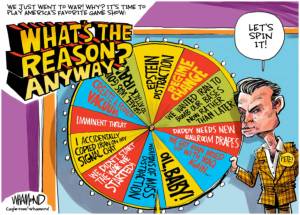Milbank: Trump isn’t hurting GOP in other races, research finds
Published 1:30 am Thursday, September 29, 2016
By Dana Milbank
It seemed like a no brainer: Tie down-ballot Republican Candidate X to Donald Trump and watch Candidate X go down in his or her race for the Senate, the House or dog catcher.
This should be true in competitive races, because of the GOP presidential nominee’s record-setting unpopularity. But it’s not working out that way. There’s new evidence that attempts to tie other Republicans to Trump isn’t playing well — and it might even be hurting Democrats.
The Democratic Congressional Campaign Committee, the entity in charge of the Democrats’ efforts in the House, has been running ads this month linking Republican candidates to Trump in Texas, Iowa, Minnesota, Florida, Nevada and Pennsylvania. The ads follow a similar script, noting Trump’s disparagement of women and the disabled, his attack on a Gold Star family, his reckless national-security talk or some other misdeed — then pointing out that the local Republican “supports” or at least “refuses to disavow” Trump.
But does the cookie-cutter cut it?
The House Majority PAC, a super PAC trying to boost Democrats’ prospects in the House, polled in 25 competitive districts and noticed that tying the local Republican to Trump was only among the top-testing negative attack lines in three or four.
So Alixandria Lapp, the super PAC’s executive director, had a liberal group called the Analyst Institute run a controlled experiment, sending direct mail to 108,000 independents and Republicans in a half-dozen districts in California, Colorado, Illinois, Minnesota and Virginia.
The findings were intriguing. Those voters who received three pieces of mail tying the local Republican candidate to Trump (mainly on national security) increased their support for the Democratic congressional candidate by 2.7 percent over voters in a control group who received no mailings. But those who received mailings attacking the Republican on issues without mentioning Trump increased their support for the Democrat by 5.2 percentage points — nearly twice as much.
And the attempt to tie the local Republican to Trump actually backfired in a way, by hurting Hillary Clinton. Support for Clinton among those receiving the anti-Trump mailings declined 3.5 percent relative to the control group. Possibly, voters took the news that the local Republican congressional candidate backed Trump as a validation of Trump — evidence that he’s not as crazy as they thought.
“It’s a raging debate,” Lapp says. “Do you say that every Republican equals Trump and they’re just like Trump? Or is that not believable and it doesn’t really work?”
Trump should still help Democrats down the ballot. He’s expected to provoke minority voters to turn out in high numbers, and he’s depressing support among surviving Republican moderates. But with the Senate, many congressional races and control of state legislatures in the balance, wasting money on a fruitless effort to turn all Republicans into Trump could be a consequential mistake.
Even the DCCC, which like the Democratic Senatorial Campaign Committee has labored mightily to make all Republicans wear the scarlet T, recognizes the limits of tarring with Trump. “Trump is a big part of our strategy, particularly with well-educated suburban voters and communities of color,” says Meredith Kelly, the DCCC press secretary. “This is a nationalized environment, and Trump is on everyone’s mind.”
Why isn’t the Trump taint more effective?
For one, Republicans don’t much care. The Analyst Institute experiment found that the mailings linking the local Republican to Trump didn’t diminish enthusiasm for the Republican candidate at all. Independents may be moved slightly by the Trump taint, but they’re not as alarmed by Trump’s antics as Democrats supposed they would be.
The House Majority PAC didn’t test the Trump effect on Democrats, but the Democratic group Democracy Corps did — and it found that Democrats, too, were less persuaded by attempts to paint down-ballot candidates with the Trump brush. Among “unconsolidated” Democrats not backing Clinton, an economic message was more convincing than a Trump-centric message by eight percentage points. Among Democrats backing Clinton but not the Democratic Senate candidate, the economic message was more convincing by 13 percentage points.
Ultimately, it may be that voters of all stripes perceive that Trump is one of a kind, that he’s such an outlier in American politics that they recognize the difference between him and their senators or representatives. Republicans’ nominating process and indulgence of extremists may have made Trump possible, but he’s not a typical Republican.
And there’s a cruel irony: Trump may be less of an albatross to down-ballot Republicans precisely because he’s such an odd bird.
Dana Milbank is a Washington Post columnist.


